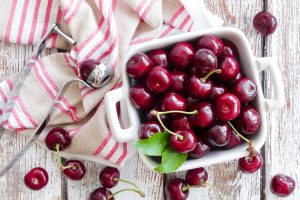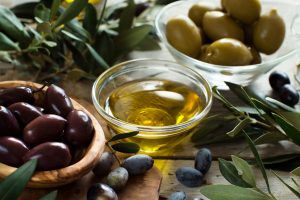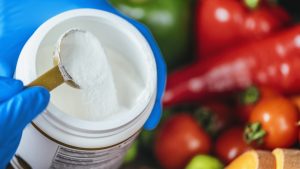Your diet can affect your joints. Some foods are helpful for your joint health—strengthening, fortifying, reducing inflammation and pain. Other foods are not as helpful. We will go over the best and worst foods for your joints so you can live your best life.
Low-fat Milk
A study from the journal Arthritis Care & Research showed that drinking low-fat milk delays the progression of osteoarthritis (OA). Over 2,000 people with knee OA participated over the course of the study. Groups were given different amounts of milk each week and results were gathered at 12, 24, 36 and 48 months. Not surprisingly, the groups that drank more milk saw better results
Tart Cherries
 One study from Oregon Health & Science University (OHSU) found that tart cherries have potent anti-inflammatory properties. In the study, women ages 40 to 70 with inflammatory osteoarthritis drank tart cherry juice, twice a day for three weeks. These women experienced a significant reduction in inflammation. The study led researchers to say that cherries have the “highest anti-inflammatory content of any food.” You can consume cherries fresh, frozen, dried, or juiced to help reduce your joint pain.
One study from Oregon Health & Science University (OHSU) found that tart cherries have potent anti-inflammatory properties. In the study, women ages 40 to 70 with inflammatory osteoarthritis drank tart cherry juice, twice a day for three weeks. These women experienced a significant reduction in inflammation. The study led researchers to say that cherries have the “highest anti-inflammatory content of any food.” You can consume cherries fresh, frozen, dried, or juiced to help reduce your joint pain.
Whole Grains
Whole grains like oatmeal, quinoa, brown rice and barley are much better for your joints than refined grains. These are linked with reduced inflammation, but refined grains can increase inflammation. This is important for people with joint pain as well as athletes training for an event—don’t just eat for the fuel. Eat for healing and joint health, too.
Red Peppers and Tomatoes
Red peppers and tomatoes are loaded with vitamin C. This vitamin is important for your body to make collagen, the abundant protein that helps build your cartilage, tendons, and ligaments.
Virgin Olive Oil

Olive oil contains omega-3 fatty acids, which help reduce inflammation. Researchers have observed the anti-arthritic benefits of a Mediterranean diet, which frequently uses olive oil.
It also contains oleocanthal, which has anti-inflammatory properties. In fact, oleocanthal has the same enzymes as ibuprofen, which is why it can have a similar effect. The Arthritis Foundation in the U.K. recommends 2 – 3 tablespoons of olive oil per day.
Fatty Fish
Fish like salmon and mackerel are rich in omega-3 fatty acids, which can bring down inflammation and lubricate your joints. These fatty fish are also rich in calcium and vitamin D, both of which strengthen your bones. Eating fish can also substitute for eating other meats that are higher in fat.
Walnuts
Another source of omega-3s, walnuts can be a great snack for reducing inflammation. Remember, though, that walnuts are higher in calories. To maintain a healthy weight, eat sparingly. Flax seeds are another good source of omega-3s.
Dark, Leafy Greens
 Leafy greens like spinach and kale, bok choy and collard greens contain nutrients that can benefit your joints. First, they have antioxidants called beta-carotene. Research has shown that beta-carotene can slow the progression of osteoarthritis. Leafy greens and broccoli are also a good source of vitamin C. Remember, vitamin C is required for your body to make collagen. Kale and collard greens also contain calcium, which is great for your bones.
Leafy greens like spinach and kale, bok choy and collard greens contain nutrients that can benefit your joints. First, they have antioxidants called beta-carotene. Research has shown that beta-carotene can slow the progression of osteoarthritis. Leafy greens and broccoli are also a good source of vitamin C. Remember, vitamin C is required for your body to make collagen. Kale and collard greens also contain calcium, which is great for your bones.
Citrus Fruits and Berries
Another great source of vitamin C, citrus fruits and berries can help your body boost its collagen production. As a plus, they are also full of helpful antioxidants.
Turmeric
Turmeric contains a chemical called curcumin. Not only does it give your curry its color and taste, it serves as an anti-inflammatory. Some studies have even showed that curcumin equals over the counter painkillers. You can find turmeric in traditional Indian foods or take it as a supplement. Other spices like cinnamon and ginger also have anti-inflammatory properties.
Collagen Supplements
Collagen is an abundant protein that is one of the building blocks of cartilage, ligaments, and tendons. Some forms of collagen from your diet are not as easily absorbed. That’s where hydrolyzed collagen comes it. It has been broken down so your body can absorb and use it.
The Worst Foods for Your Joints
Trans Fat Foods
Packaged baked goods, potato chips, deep-fried foods—they all sound amazing, but they have one thing in common: trans fat and saturated fat. This is one of the least helpful things for you and your joints. It triggers inflammation and can lead to weight gain, which only adds more stress.
AGE Foods
 AGE stands for advanced glycation end product. Foods that are heated, grilled, fried, or pasteurized sometimes produce a toxin that damages proteins in your body. After damage has been done, your body sends cytokines which causes inflammation. This can contribute to arthritis or swollen joints. Reduce the amount of foods cooked on high heat to lower AGE levels.
AGE stands for advanced glycation end product. Foods that are heated, grilled, fried, or pasteurized sometimes produce a toxin that damages proteins in your body. After damage has been done, your body sends cytokines which causes inflammation. This can contribute to arthritis or swollen joints. Reduce the amount of foods cooked on high heat to lower AGE levels.
Refined Sugar and Carbohydrates
These can increase AGEs, which cause inflammation. It can also increase your weight and add stress on your joints.
Cheese and other Dairy Products
For some people, the proteins in dairy products irritates the tissues around the joints. For others, milk has an anti-inflammatory effect. It may depend on how you react to milk and dairy—try suspending dairy products to see how your joints respond.
The same Harvard study that found that low-fat milk improved joint and bone health also found that cheese was detrimental to joint health. This is probably because cheese is higher in fat. Excess weight can add stress on joints.
The Bottom Line
 Your diet affects your joint health. Many foods can help heal and strengthen your joints. They fight inflammation, increase collagen, and even offer pain relief similar to over-the-counter painkillers. Other foods are not as helpful (mainly foods that are high in fat or sugar or are cooked at high temperatures). You can also consider a supplement such as hydrolyzed collagen to help fortify your joints. You can get started by checking out the collagen products we have reviewed!
Your diet affects your joint health. Many foods can help heal and strengthen your joints. They fight inflammation, increase collagen, and even offer pain relief similar to over-the-counter painkillers. Other foods are not as helpful (mainly foods that are high in fat or sugar or are cooked at high temperatures). You can also consider a supplement such as hydrolyzed collagen to help fortify your joints. You can get started by checking out the collagen products we have reviewed!


Recent Comments